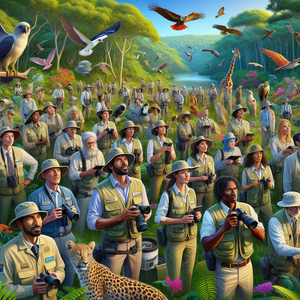
Unveiling 15 Dynamic Career Paths for Humanities Graduates
In today's evolving job landscape, humanities graduates—who delve into subjects like English, history, philosophy, and the arts—have proven that their skill set is both versatile and valuable. They emerge with strong critical thinking abilities, effective communication skills, and a nuanced understanding of cultural dynamics. Contrary to the common belief that a humanities degree may confine career options, these graduates are actually well-equipped for a plethora of gratifying careers across diverse sectors. Studies reveal that many humanities alumni enjoy competitive salaries and high job satisfaction, underscoring their adaptability to both conventional and innovative roles. This article explores 15 engaging career opportunities that not only highlight the essential skills required but also illuminate the contributions of these roles within the broader humanities context.
Job Summaries:
High School Teacher:
- High school teachers specialize in subjects like English literature or history.
- They play a pivotal role in shaping young minds.
- They develop engaging lesson plans and assess student performance.
- They foster a deeper understanding of human experiences.
- A bachelor’s degree in education or a related field is typically required.
- State certification is also typically required.
- The impact of high school teachers is profound.
Human Resources Specialist:
- In the realm of human resources, specialists are vital for managing workforce dynamics.
- They engage in recruiting, interviewing, and onboarding talent, alongside maintaining employee relations and adherence to labor laws.
- A degree in human resources or business administration, paired with strong interpersonal skills, is essential for creating a positive organizational culture.
Graphic Designer:
- Graphic designers channel their creativity into crafting compelling visual content for various platforms, from websites to advertisements.
- A degree in graphic design is often necessary, complemented by a robust portfolio.
- This role marries artistic expression with effective communication, crucial in an increasingly visual world.
Copywriter:
- Copywriters are the architects of persuasive content.
- They weave narratives that captivate audiences through advertising and brand storytelling.
- A background in English, marketing, or communications enhances their ability to connect through words.
- This profession is integral to the humanities.
- It marries storytelling with consumer psychology.
Editor:
- Editors are the unsung heroes of the written word.
- Refining content for clarity and style.
- Ensuring adherence to publication standards.
- Typically requiring a bachelor’s degree in English or journalism.
- Editors play a significant role in shaping narratives.
- Maintaining the integrity of literary works.
Public Relations Specialist:
- In the fast-paced world of public relations, specialists craft and manage the public image of organizations.
- They produce media releases and develop communication strategies, often with degrees in public relations or communications.
- Their work is critical in shaping public narratives and societal perceptions.
Social Media Manager:
- As digital communication evolves, social media managers are at the forefront, strategizing to boost an organization’s online presence.
- A background in communications or marketing is beneficial.
- This role emphasizes the importance of audience engagement in the digital age.
Museum Curator:
- Museum curators are dedicated to managing collections and organizing exhibitions.
- They ensure the public is educated about historical and cultural significance.
- Often requiring a master’s degree in museum studies or history.
- They play an essential role in preserving and interpreting our cultural heritage.
Technical Writer:
- Technical writers specialize in creating clear and concise user manuals and documentation.
- They make complex information accessible.
- A degree in English or communications is beneficial.
- Strong analytical skills are important for technical writers.
- They bridge technical knowledge with user understanding.
Market Research Analyst:
- Market research analysts delve into consumer behavior to understand market trends.
- Typically requiring a bachelor’s degree in marketing or a related field.
- They provide insights that shape strategic marketing initiatives.
- Linking humanities to consumer preferences.
Content Strategist:
- Content strategists play a crucial role in aligning content plans with marketing goals.
- Ensuring consistent messaging across platforms.
- A background in marketing or communications is often needed.
- Emphasizing the importance of narrative and audience connection in effective content creation.
Librarian:
- Librarians are custodians of knowledge.
- Managing resources and services to help patrons access information.
- A master’s degree in library science is commonly required.
- Their work supports the humanities by promoting literacy and cultural exploration.
Event Coordinator:
- Event coordinators are the orchestrators behind various gatherings.
- They ensure each event runs smoothly and effectively.
- A degree in hospitality management or marketing is frequently preferred.
- They facilitate cultural experiences and community engagement.
Public Policy Adviser:
- Public policy advisers analyze and recommend policies to government officials.
- They influence societal decision-making.
- Typically requiring a degree in political science or public administration.
- Their contributions highlight the intersection of humanities and governance.
Business Development Manager:
- Business development managers identify growth opportunities through strategic relationship-building and market analysis.
- A degree in business or marketing is usually necessary.
- Emphasizing the significance of interpersonal skills and strategic thinking in driving business success.
The professional landscape for humanities graduates is rich and varied, offering numerous career paths that capitalize on their distinctive skills and perspectives. While the opportunities may span a wide range, adaptability is paramount as many graduates carve out successful careers in fields that extend beyond their immediate studies. Those intrigued by these diverse roles should actively explore current job openings that resonate with their passions and aspirations. By recognizing the inherent value of a humanities education, graduates can unlock their full career potential and make meaningful contributions across multiple sectors.
Explore More Jobs

